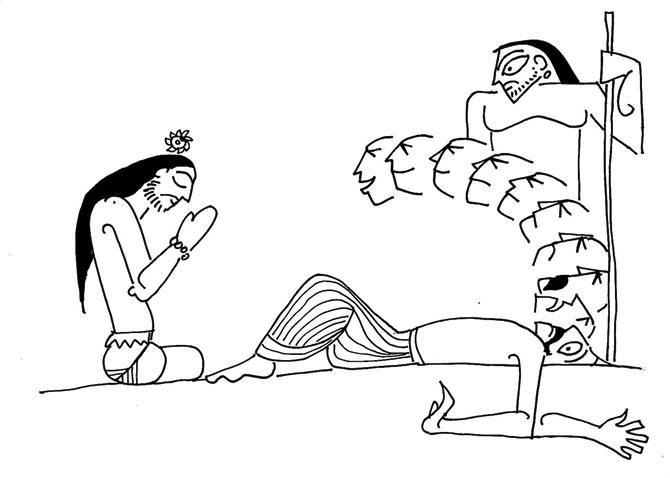After striking Ravana with a fatal arrow, Ram tells Lakshman to go to Ravana and seek knowledge from him for 'he is an educated brahmin, his faults notwithstanding.'

 After striking Ravana with a fatal arrow, Ram tells Lakshman to go to Ravana and seek knowledge from him for ‘he is an educated brahmin, his faults notwithstanding.’ But Ravana turns his face away from Lakshman who complains to his brother than ‘the villain is too proud to share anything even as he is dying’. Ram then casts his weapons aside and falls at Ravana’s feet and requests him to share his wisdom. Ravana looks pleased and says, “Ram, you sit at my feet in humility while Lakshman stood at my head demanding my knowledge like an entitled conqueror. You are, indeed, a student worthy of my knowledge. Let me tell you whatever I can before I die. Know this that the mind tends to shun all things good for our life and seek all things bad for our life. To attain wisdom, witness the tricks of the mind. May you succeed where I failed.”
After striking Ravana with a fatal arrow, Ram tells Lakshman to go to Ravana and seek knowledge from him for ‘he is an educated brahmin, his faults notwithstanding.’ But Ravana turns his face away from Lakshman who complains to his brother than ‘the villain is too proud to share anything even as he is dying’. Ram then casts his weapons aside and falls at Ravana’s feet and requests him to share his wisdom. Ravana looks pleased and says, “Ram, you sit at my feet in humility while Lakshman stood at my head demanding my knowledge like an entitled conqueror. You are, indeed, a student worthy of my knowledge. Let me tell you whatever I can before I die. Know this that the mind tends to shun all things good for our life and seek all things bad for our life. To attain wisdom, witness the tricks of the mind. May you succeed where I failed.”
ADVERTISEMENT
 Illustration/Devdutt Pattanaik
Illustration/Devdutt Pattanaik
This folktale inspired by the Ramayana can be read in multiple ways to reveal the complex layers of the mind.
We can read it as endorsing the knowledge of Ravana, the rakshasa-king, who was well-versed in the Vedas. Even Ram respects it.
Or, we can read it showing the relationship between teacher and student. A bad student is one who does not respect the teacher, a behaviour displayed by Lakshmana who stands near Ravana’s head. A good student is one who respects the teacher, a behaviour displayed by Ram, who sits at Ravana’s feet.
It can also be read as a story that contrasts the behaviour of God (Ram) and a common man (Lakshman), or a story that tells us how Ravana is so arrogant that even while dying he demands respect before sharing his knowledge. It can show Ram is manipulative and wants to get hold of Ravana’s intellectual assets, besides his material assets, and does so using humility as a technique. Lastly, it is a reminder that getting knowledge is far more difficult than securing wealth. When we die, we leave behind our material assets but take our intellectual assets with us. We can leave behind Lakshmi passively, but not Saraswati. To pass on Saraswati we have to actively and consciously share our knowledge with a student.
Which interpretation is right? People often argue on motives of heroes and villains. They become lawyers and judges. But in doing so they miss the overall architecture of Hindu epics. And their conclusions are usually their own personal beliefs, rooted in their own prejudices.
In Hindu epics, unlike Greek epics, the hero does not change, grow or transform, for the hero is God. And God is wise, with knowledge of the infinite despite his mortal form. God, Ram of the Ramayana, enables humans to discover their humanity, or lack of it. Sometimes he succeeds, as in case of Hanuman of the Ramayana, who from monkey transforms into God with temples of his own. Sometimes not, as in case of Ravana, or even Lakshmana. Ravana does not learn despite being killed. Lakshman does not learn despite being a younger brother. What do they not learn? To overcome insecurity that makes us want to control and dominate, or be impatient with the world. To see life for what it is, not we want it to be.
The author writes and lectures on the relevance of mythology in modern times. Reach him at devdutt@devdutt.com. The views expressed in these columns are the individual’s and don’t represent those of the paper.
 Subscribe today by clicking the link and stay updated with the latest news!" Click here!
Subscribe today by clicking the link and stay updated with the latest news!" Click here!







